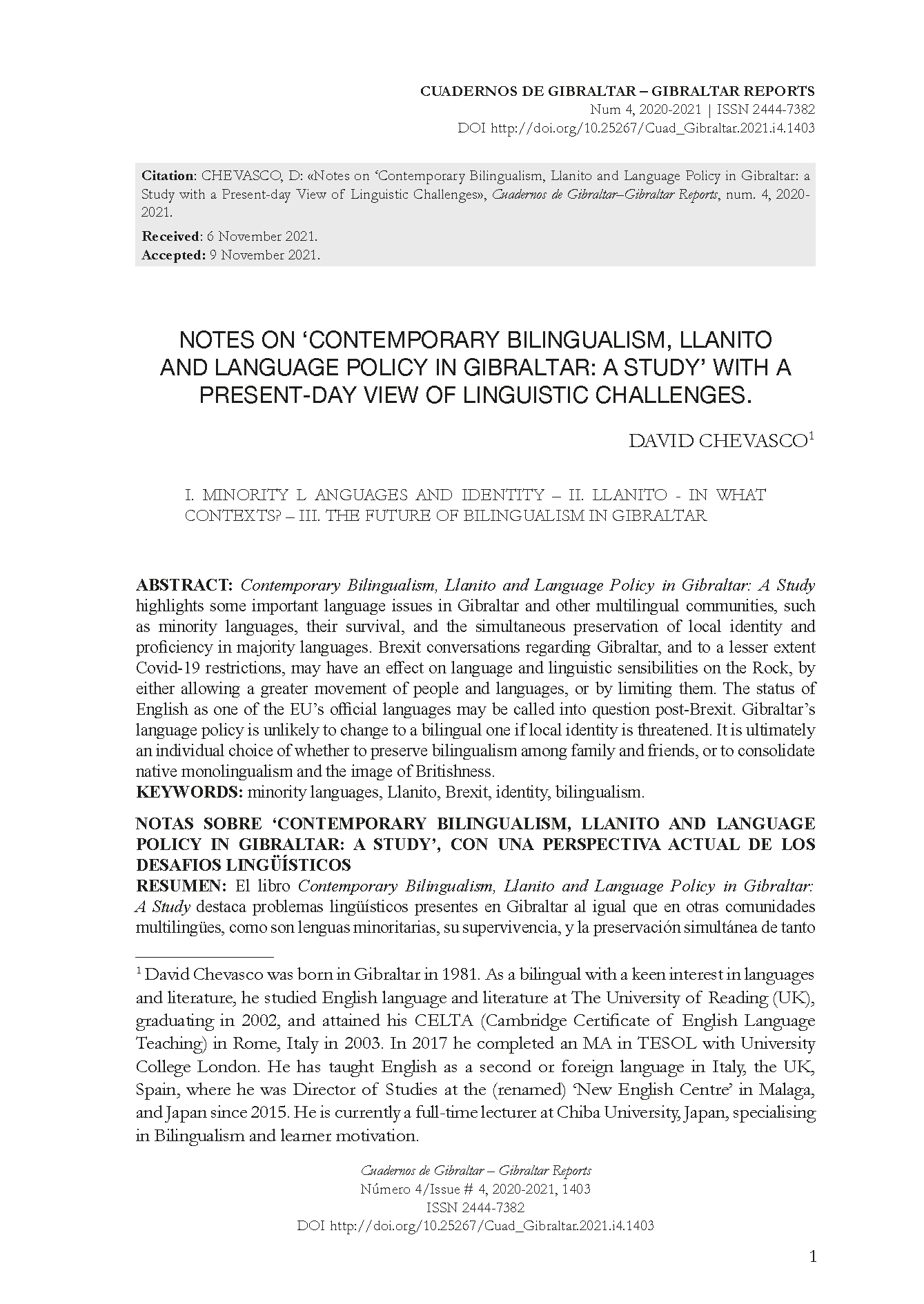Notes on ‘Contemporary Bilingualism, Llanito and Language Policy in Gibraltar: a Study with a Present-day View of Linguistic Challenges
Abstract
Contemporary Bilingualism, Llanito and Language Policy in Gibraltar: A Study highlights some important language issues in Gibraltar and other multilingual communities, such as minority languages, their survival, and the simultaneous preservation of local identity and proficiency in majority languages. Brexit conversations regarding Gibraltar, and to a lesser extent Covid-19 restrictions, may have an effect on language and linguistic sensibilities on the Rock, by either allowing a greater movement of people and languages, or by limiting them. The status of English as one of the EU’s official languages may be called into question post-Brexit. Gibraltar’s language policy is unlikely to change to a bilingual one if local identity is threatened. It is ultimately an individual choice of whether to preserve bilingualism among family and friends, or to consolidate native monolingualism and the image of Britishness.
Keywords
Downloads
How to Cite
License
Copyright
Papers will be published under the condition that the author or authors yield to the Journal exclusive reproduction rights. Cuadernos de Gibraltar–Gibraltar Reports is an open access journal which means that all content is freely available without charge to the user or his/her institution. Users are allowed to read, download, copy, distribute, print, search, or link to the full texts of the articles, or use them for any other lawful purpose, without asking prior permission from the publisher or the author. This is in accordance with the BOAI definition of open access.
References
Anchimbe, E. A., Structural and Sociolinguistic Perspectives on Indigenisation. Dordrecht: Springer Netherlands. 2014.
Auckle, T. and Barnes, L. “Code-Switching, Language Mixing and Fused Lects: Emerging Trends in Multilingual Mauritius”, Language Matters 42, 1, 2011: 104–25.
Chevasco, D., Contemporary Bilingualism, Llanito and Language Policy in Gibraltar: A Study, Universidad de Cádiz, 2019.
Kellermann, A., A New New English: Language, Politics, and Identity in Gibraltar, Heidelberg: Herstellung, 2001.
Kerswill, P., “Migration and language”, in Klaus Mattheier, Ulrich Ammon & Peter Trudgill (eds.) Sociolinguistics /Soziolinguistik. An international handbook of the science of language and society, 2nd ed. Vol 3. Berlin: DeGruyter. 2006.
Kużelwska, E., “Impact of Brexit on the status of the English language in the European Union”. Środkowoeuropejskie Studia Polityczne University of Białystok, 2019.
Levey, D., Language Change and Variation in Gibraltar, John Benjamins Publishing, 2008.
May, S., “Language Rights: Moving the Debate Forward”, Journal of Sociolinguistics 9, 3, 2005: 319–47.
Peñalva, S. L., “An Ethnographic Portrait of Translingual/Transcultural Navigation among Immigrant Children and Youth: Voices during Sunday School at a Latino Church”, Journal of Multilingual and Multicultural Development. 2016: 1–15.
Pérez-Milans, M., “Language and identity in linguistic ethnography”, in S. Preece (ed) The Routledge Handbook of Language & Identity, New York and London: Routledge, 2015.
Sayer, P., “Demystifying Language Mixing: Spanglish in School”, Journal of Latinos and Education. 7, 2, 2008: 94–112.







